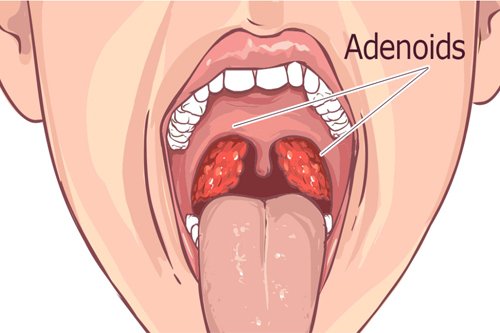Brain and ENT Clinic – Dr Lalit Mahajan In Nagpur & Dr Rachna Gangwani Mahajan In Nagpur
Adenoidectomy in Nagpur

Adenoidectomy in Nagpur is a surgical procedure that involves the removal of the adenoids. Adenoids are small glands locate at the back of the throat, behind the nose. Like tonsils, adenoids are part of the lymphatic system and play a role in the immune system, particularly in children.
- Adenoidectomy is primarily performe to address issues relate to enlarge or infect adenoids.
- Enlarge adenoids can cause various health problems, including difficulty breathing, chronic nasal congestion, snoring, sleep apnea, recurrent ear infections, and chronic sinusitis.
Symptoms of Adenoidectomy
Breathing Difficulties: Persistent nasal congestion or difficulty breathing through the nose, especially during sleep.
Chronic Ear Infections: Recurrent ear infections that may be associate with adenoid enlargement and blockage of the Eustachian tubes.
Frequent Sinus Infections: Chronic or recurrent sinus infections that may be linke to adenoid-relate issues.
Sleep Disruptions: Conditions such as sleep apnea, snoring, or interrupte sleep patterns, often due to adenoid enlargement.
Chronic Mouth Breathing: Habitual breathing through the mouth, which can be a sign of adenoid obstruction.
Hyponasal Speech: Changes in speech, including hyponasal or nasal-sounding speech, which can be cause by adenoid enlargement affecting the resonance of the voice.
Procedure of Adenoidectomy
Anesthesia: Adenoidectomy is commonly performe under general anesthesia, especially in children. This ensures the patient is completely asleep and comfortable during the procedure.
Surgical Technique: The surgeon accesses the adenoids through the mouth, eliminating the need for external incisions. Using specialize instruments, the adenoids are carefully remove to alleviate breathing difficulties and resolve associate health issues.
Duration: The surgery is typically brief, often taking less than an hour, making it an outpatient procedure in most cases.
Indications for Adenoidectomy:
Enlarged Adenoids: When adenoids become enlarge, they can obstruct the airways, causing breathing difficulties, especially during sleep.
Recurrent Infections: Chronic infections of the adenoids that do not respond to other treatments may necessitate removal.
Ear Infections: Adenoid-related issues can contribute to persistent ear infections, and adenoidectomy may be recommende in such cases.
Recovery Process:
Post-Operative Care: Following the procedure, patients receive guidelines for a smooth recovery. This often includes pain management strategies and specific dietary recommendations.
Return to Normal Activities: While recovery times vary, many individuals can resume normal activities within a week. Complete recovery may take a bit longer.
Benefits of Adenoidectomy
- Improve Breathing: Removal of enlarge adenoids can enhance airflow through the nasal passages.
- Reduce Infections: Adenoidectomy can decrease the frequency of throat and ear infections.
- Resolution of Sleep Issues: In cases of sleep apnea or snoring, adenoidectomy may lead to improve sleep quality.
